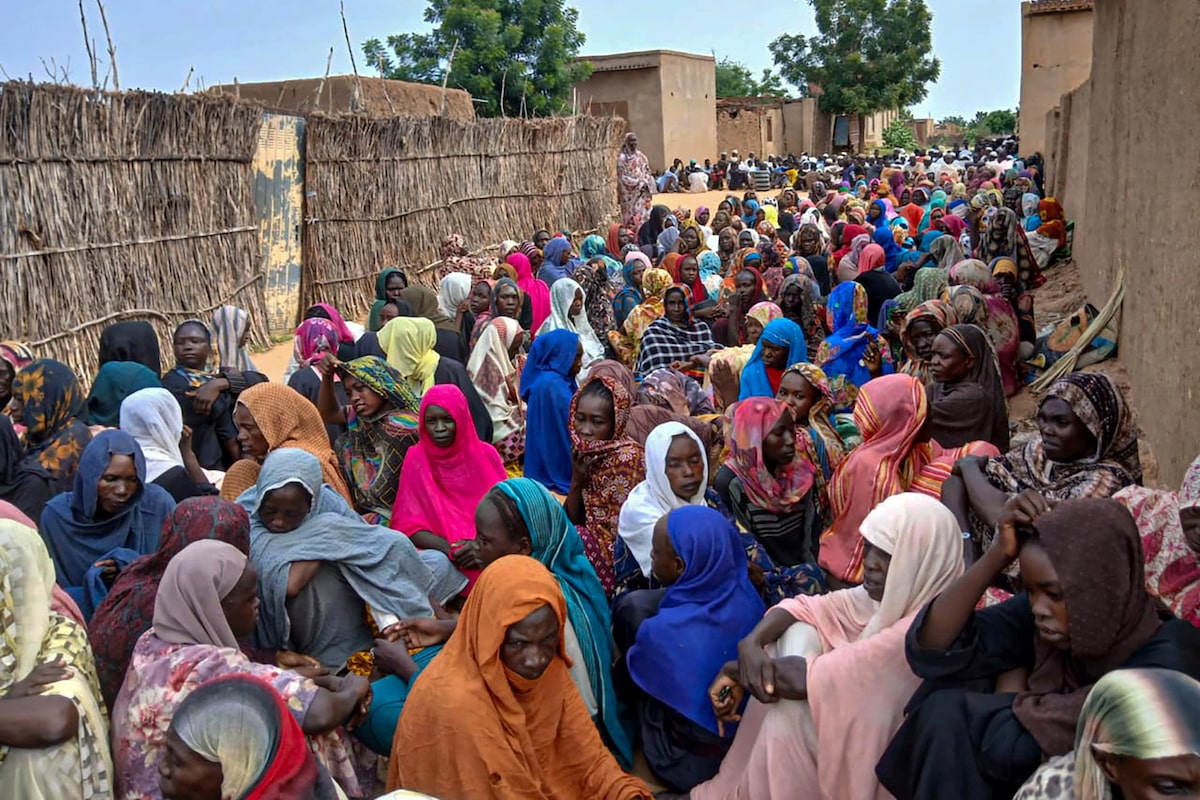Sudanese residents gather to receive free meals in El-Fasher, a city besieged by Sudan’s paramilitary Rapid Support Forces, in Darfur region in August, 2025.STR/AFP/Getty Images
A missile strike has killed scores of people at morning prayers in a crowded Sudanese mosque, the latest atrocity in the prolonged siege of a city in western Sudan where famine and starvation are looming.
The death toll at the mosque in El Fasher has climbed to 78, with rescuers still searching for survivors and bodies, according to human-rights monitors in the Darfur region. The Sudanese government said more than 70 people were killed.
The missile was reportedly fired on Friday morning by a Chinese-made drone, operated by the Rapid Support Forces (RSF), the powerful militia that has been battling the Sudanese army since the war erupted in 2023.
Videos on social media showed dozens of bodies wrapped in blankets and sheets for burial. One video showed massive destruction at the mosque, with crumpled bodies strewn beneath piles of rubble and broken metal.
Opinion: In Sudan’s war, civilians – and democracy at large – are under siege
Denise Brown, a Canadian who serves as the United Nations humanitarian co-ordinator in Sudan, said she was deeply alarmed by the attack. The perpetrators must be held accountable, she said in a statement.
“International humanitarian law demands the protection of mosques and the civilians worshipping in them,” Ms. Brown said. “It is also a war crime to intentionally direct attacks against buildings dedicated to religion.”
Human-rights groups and the U.S. government have described the situation in Darfur as a genocide. El Fasher, the capital of North Darfur, has been under siege for 17 months as the RSF seeks to capture the only major city in Darfur that it does not yet control.
The UN estimates that 260,000 people, including 130,000 children, are trapped in the city and cut off from emergency aid. Thousands are malnourished and dozens have already died of hunger, the UN says. Emergency kitchens have been shutting down because of a lack of supplies, and many people are resorting to eating animal fodder to survive.
Trump-backed peace plan in Sudan faces opposition from army-controlled government
Some women and children in the besieged city have been digging trenches and underground bunkers in their own homes in an attempt to survive the relentless artillery shelling and missile strikes by the RSF, according to the Ayin Network, a Sudanese media outlet, which posted videos of children clambering into makeshift bunkers.
A new report by Yale University’s Humanitarian Research Lab, based on satellite images and other data, has concluded that El Fasher is likely to fall to the RSF soon. The paramilitary force has advanced into the city with more than 80 vehicles, capturing a former Sudanese army base this week, while the army’s resistance is dwindling and its equipment is diminishing, the report said.
It warned that the RSF was “highly likely to conduct a range of systematic mass atrocities” if it captures El Fasher and the city’s Abu Shouk refugee camp. In 2023, RSF fighters killed 10,000 to 15,000 civilians in an ethnically targeted massacre when they captured the West Darfur city of El Geneina, according to UN reports.
Across Sudan, the war has left 30 million people in desperate need of emergency aid, while 13 million have fled their homes.
“We are 900 days into one of the most harrowing catastrophes in modern times,” said Jan Egeland, secretary-general of the Norwegian Refugee Council and one of the world’s most experienced relief workers.
“Atrocities continue unabated and with impunity against defenseless civilians, whom we have failed to protect,” he said in a social-media post this week. “This is a civilization at absolute breaking point, and yet funding for the humanitarian response is collapsing and life-saving programmes are shutting down.”
Opinion: The crisis in Sudan shows us telecommunication is an essential human right
In a report on Friday, the UN’s human-rights office documented the killing of at least 3,384 civilians across Sudan in the first half of this year. It warned of “a significant rise in civilian killings, including summary executions, amid growing ethnic violence and a worsening humanitarian situation.”
The true death toll is believed to be much higher, because there is little UN access to some of the worst war zones in the country.
Outside the conflict zones, at least 990 civilians were killed this year, including in summary executions, with children as young as 14 or 15 among those executed, the report said.
The number of such killings tripled from February to April after the army pushed the RSF out of Khartoum, triggering campaigns of reprisals against alleged RSF collaborators, the report said.
